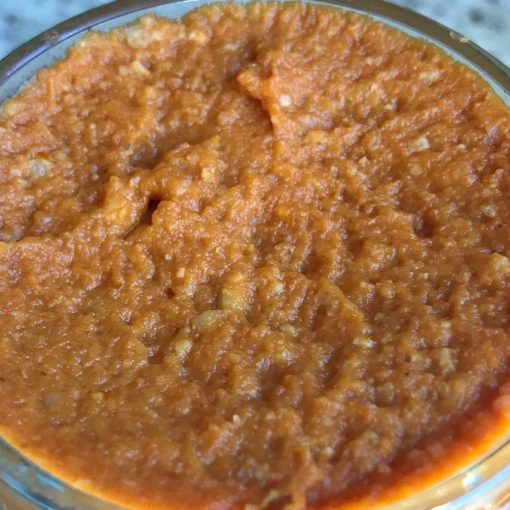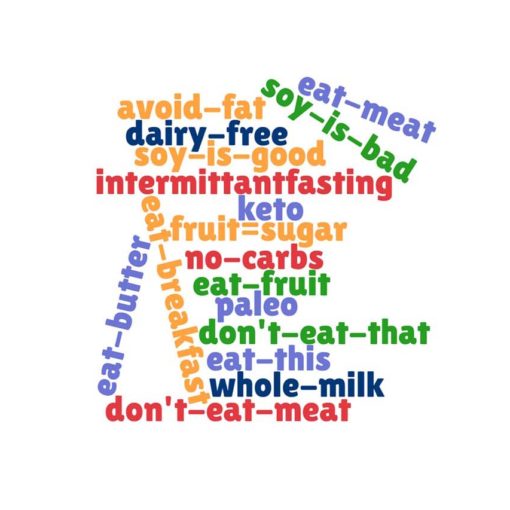Podcast: Play in new window | Download (Duration: 13:25 — 13.9MB)
Subscribe and don't miss an episode! Apple Podcasts | Spotify | Android | iHeartRadio | Deezer | RSS
Our ancestors didn’t have the choice to eat foods out of season, for the most part. However, today, we can find berries in our food markets in the dead of winter. Our bodies, though, know when it’s summer or winter and we do best when we are in sync with the seasonal foods that we evolved eating. They can warm us, cool us down, give us energy, help our immune systems, and so on. If we feed our bodies in this way, we can live our healthiest lives.
Transcript of Seasonal Eating podcast
Edited for clarity
Debbie 00:01
One of our many mantras is to eat seasonally. And the reason for that is many, but seasonal food generally is fresher, tastier and more nutritious than food consumed out of season. And in this podcast, we’re going to discuss all the seasons and the reasons why it’s best to eat food that’s harvested locally. And seasonally. I’m Debbie.
Wendy 00:27
I’m Wendy.
Debbie 00:28
And let’s talk about seasonal eating.
Wendy 00:30
Let’s talk about fall and winter. It’s upon us and everything’s changed. No more stone fruits. And now we have citrus and
Debbie 00:38
Pears and apples.
Wendy 00:40
Yeah, cranberry season is upon us.
Debbie 00:41
Right, right. However, it’s a little bit misleading because stores keep foods that are not in season, because there’s a demand for them like berries.
Wendy 00:51
And so eating things seasonally really sparked the tastebuds. That’s why an apple in the middle of summer just doesn’t taste very good. Because it’s from last season. Hanging out in some storeroom someplace.
Debbie 01:03
Yeah, exactly. And right now, apples are delicious. And you can tell in the stores, there’s so many different varieties of apples right now. It’s because everybody is harvesting right now. So they’re around–apples and pears, especially. So those are, those are the fruits–that and citrus that’s what you eat right now.
Wendy 01:20
An apple a day keeps the doctor away.
Debbie 01:24
Yes, so there’s so many reasons to eat seasonally in fall and winter, especially because our immune systems are always . . .
Wendy 01:33
challenged?
Debbie 01:34
Good word! They are! They’re challenged in the winter, because we’re all inside close together and sharing germs a little bit more easily than we are in the summertime. It’s not that the germs aren’t there in the summer, it’s just that now we’re kind of packed together a little bit more and we transfer them a little bit more easily. So foods that grow in the fall in the winter or harvested in the fall and winter, ours are supporting our immune systems. Although citrus may not be New Jersey, local foods, they are high in vitamin C, which is a huge antioxidant–it really boosts our immune system. So that’s why they grow in the colder weather, even where they’re local. It’s colder weather for them. So that’s why they’re seasonal. In Florida. It’s it’s not 90 degrees, at least most of Florida in the middle of the winter. So it grows in colder weather to boost people’s immune system.
Wendy 02:21
In winter, we’re needing more warm food. So that’s why the winter squash, you know, they’re all roasting or we’re steaming them, baking them.
Debbie 02:31
Right. And these squashes and root vegetables are denser, heavier foods, and we need those dense, heavier foods in our system. We need the sugars that they provide. And we need that warming quality that they provide. That’s what winter foods do is they provide a warming our metabolism kicks in to help digest them. And that keeps it a little bit more warm. And the way we cook in the winter. For sure.
Wendy 02:55
Yeah, soups and stews and roasting and baking,
Debbie 02:59
Right. It’s all warming qualities. So that’s what we need.
Wendy 03:03
And paying attention to that kind of, you know, Mother Nature is just so smart. Yeah, it really if we follow the seasons a little bit more, and we are– no one is looking for perfection. So if you are craving berries in the middle of winter, maybe you’ve frozen some. They’ll probably taste a lot better if you freeze them fresh, than getting something. . .
Debbie 03:28
–that was shipped to all the way from Chile or somewhere else where they’re in season right now, which is what’s happening. Yeah. So another interesting thing about seasonal eating is that our bodies actually change throughout the seasons. Our microbiome changes throughout the seasons. So right now, our bodies are adjusting to match the season. And they’re promoting all these different digestive microbes that are supporting balanced immunity, our digestion for these heavier foods, our mood, our energy, our blood sugar, our sleep. Everything is being supported by our altered microbiome right now. It’s kind of shifting into the colder weather. And those bacterias in that microbiome are there to help support themselves and their host, which is us, to survive better in the colder weather.
Wendy 04:17
Yeah, so I think too in the fall/winter, we want to make sure we’re not running away from fat because we need it. Yeah, we need the fat to absorb all the nutrients of all those squashes and all the vegetables we’re having now.
Debbie 04:32
And the vitamins that are available through those foods, those are fat soluble vitamins, right? A lot of the vitamins that we need in the winter are the fat soluble vitamins which is why we crave fats and salts in the wintertime. Our bodies and nature know what to do if we actually listen to it.
Wendy 04:53
So one of the other wonderful things about eating locally and shopping with the seasons is that it’s actually less expensive. Berries, right now, they’re really expensive, because we are shipping them from other countries. So, eating with the seasons and eating locally, not only we’re voting with our dollar to support the local farmers, you know, keeping it in our backyard, right? It’s cheaper.
Debbie 05:20
That’s right, we want to support the local farmers too. It’s also environmentally much, much better, because we’re not shipping them from another country using all that gas, and petrols and all of the chemicals that they use, and all the stuff that they do to transport them and preserve them.
Wendy 05:37
Keeping them looking all pretty and perfect.
Debbie 05:40
So there’s a lot of energy that goes into that, that’s not necessary, if you can just buy foods that grew, you know, right around the corner here, and are in season, they taste better too it just tastes better when you have food that was just harvested. Yeah. And what goes along with tasting better is nutrient density. You know, the reason it tastes better is because all the nutrients are intact. So, if you’re eating something that was harvested, you know, 5000 miles away, or 10,000 miles away, it’s gonna take a while to get here, and those nutrients die on the way here. You know, the stores do, for the most part, have seasonal foods there, if you pay attention, the ones that they’re usually out in the open are the ones that are seasonal, because they’re gonna taste best, and they want to sell us the foods that taste best, because they want us to buy it again. So pay attention to that and go to your market, go to your local markets, buy organically when you can, because that’s important too. That’s voting with your dollars. If you go to a store that advertises local, choose that, you know, we want to support those farmers and it should be cheaper too. It’s it’s a win win all around!
Wendy 06:43
All around for us, the environment, the local farmer. Everything benefits when we eat more locally. And in order to get creative, going to spices, warming spices are a fabulous way to mix up the palate, so you don’t get bored through the winter.
Debbie 07:01
That’s right. So cinnamon, cardamom, curry . . .
Wendy 07:06
Nutmeg!
Debbie 07:07
All these warming spices and deliciousness is all serving our bodies well.
Wendy 07:13
In the winter, we’re eating more fat, and meat. And so we tend to be a little bit more quiet in our bodies as well. So in the spring, when everything’s moving around, we need to actually flush that out. So if we’re eating the greens, and the chlorophyll and that energy, and it actually helps move our toxins through the body, actually flush it out. So greens are like a rainforest in the body and provides us the energy that we need to kind of transition to the life.
Debbie 07:53
And it’s not so much that what we’re eating in the winter is not good for us. It’s what we need at that time to keep us warm. But what keeps us warm, we don’t want in the spring so much we need to let go of that so that we can start to cool off towards the summertime. And it’s a matter of also rehydrating ourselves after the long winter of dehydration. Most of us get somewhat dehydrated during the winter. It’s just normal. Everybody feels a little drier, their skins drier. We have rough patches on our bodies, no matter how much moisturizer we use, and that’s normal. That’s winter. So how do we rehydrate–our body actually does it for us, if we’re eating the right foods, it’s kind of interesting, you might notice that you start to retain water in the springtime.
Wendy 08:39
And it’s also interesting that the spring harvest is very low in fat. And that helps our body reset its ability to metabolize fat as fuel.
Debbie 08:53
Right. And that makes the body burn the fat for energy then.
Wendy 08:56
It’s miraculous! It’s so natural.
Debbie 09:00
Right? And that an interesting–that’s exactly what we need to do. If we eat the right foods. We eat low fat, it’ll take care of it–it’ll get rid of the extra fat automatically without having to do all of these efforts that people go through to try to get rid of their winter weight. And what a lot of the greens do, especially the dark greens, a chlorophyll are liver cleansers. And that’s exactly what we need. Because during the winter, our liver takes on a lot of toxins and fat holds toxins. So when we’re eating a lot of fat and our bodies holding on to fat, that’s where all the toxins go. Regardless of how healthy you are. We all have toxins. And so the spring is a time that our body naturally starts to cleanse out our liver.
Wendy 09:43
So often in the spring, we have the spring colds and we get all this mucus and we get the asthma and we get the allergies. And one of the interesting things about that is that if we haven’t had actually enough fat in the winter, we get clogged up even more because our body needed that fat in the winter.
Debbie 10:05
Fat is anti-inflammatory. So if you’re not getting enough of it, then your body becomes inflamed. Mucus is the result of inflammation.
Wendy 10:14
Alright, so the spring, right, nature offers us relief from all that mucus. And all that chlorophyll that we just mentioned really just helps flush that out.
Debbie 10:24
To break it up.
Wendy 10:25
So yeah, if you’ve got inflammation in the form of extra mucus and sneezing and colds and allergies, you want to make sure you’re crowding all that out and flushing it out with the greens.
Debbie 10:34
Eat those sprouts! That’s the best allergy prevention, the bitter greens and the roots also scrape the mucus off the intestines. So it’s not just in our sinuses and in our head where we feel it. It’s also in our intestines as well. And it helps cleaning the blood and the liver and helps the liver do what it does best to–spring cleaning.
Wendy 10:59
Strawberries taste so amazingly delicious, in the spring and summer.
Debbie 11:05
They don’t taste better at any other time.
Wendy 11:07
Never, never.
Debbie 11:08
And that goes for every food that’s made season, it tastes best when it grows, where it’s supposed to grow when it’s supposed to grow.
Wendy 11:15
It’s nutrient rich right out of the ground.
Debbie 11:17
That’s right. And we’re getting it locally, you know, instead of getting shipped from California in January, it’s going right here, you know and get those strawberries maybe just picked that morning or the day before. There’s nothing better.
Wendy 11:30
There’s something beautiful, too, about being able to shake the hand of the farmer, you know, look him in the eye and say, “Thanks for–thanks for making this amazing food for us.”
Debbie 11:41
Or growing your own.
Wendy 11:42
Or growing your own. Yeah, if you’ve got the sun, right, what a wonderful way to connect with the earth.
Debbie 11:50
And, and going on that lettuce is a cooling food as are a lot of the other foods that grow–are growing now or will continue to grow throughout the summer, because that’s what our body needs right now. Needs more moisture, because we’re sweating. And it needs cooling foods because we’re sweating.
Wendy 12:06
Right? Right. So cucumbers really topped the list for me on that one.
Debbie 12:10
Watermelons too.
Wendy 12:11
Watermelon, for sure.
Debbie 12:12
So nature provides us what we need at that time. And that’s what’s beautiful about it that we’ve kind of lost, lost touch with that. So if you eat what’s in season, now it’s giving your body what it needs, which is high carbohydrates right now, which are fruits and vegetables, because we need it because we have lots of energy. Right now we’re using it we have long days for so we’re up longer, we’re burning more calories than we normally do in the fall in the winter, spring. So get out of the supermarket, go to a farmers market, because that’s where the seasonal food is, because those are the farms that are coming to the farmers market. So if you don’t have a CSA, maybe you can look for one, but finding a farmers market near you, if you don’t know where one is go to local harvest.org and you can find one there. So there’s no reason not to eat seasonally. I mean, it’s only a benefit in every way. So get out there and go to your farmers market. Get out there and grow.
Wendy 13:01
Yeah, support your local farmer. Get your hands dirty, playing around with planting a few things yourself.
Debbie 13:09
And eat fresh. Thanks for listening.
Wendy 13:12
Keep the conversation going at nourish coaches.com And stay tuned for more Nourish Noshes as we continue our quest to make the world a healthier place.






